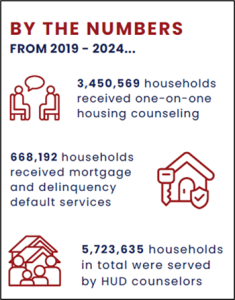The government shutdown – now heading into its fourth week – intensifies nine months of the Trump Administration’s attacks on critical agencies and programs. The Department of Housing and Urban Development (HUD) has been among the targets facing deep funding and staffing cuts: the agency has lost nearly 30 percent of staff since January 2025. Advocates have sounded the alarm about essential HUD programs under threat, such as rental housing assistance, community investment grants, and fair housing enforcement. Yet, a small but highly impactful program is also among the targets: housing counseling.
The Administration has sought to sharply reduce funding for this HUD program, with Trump’s own proposed budget zeroing out housing counseling entirely, even as the program only relies on a small budget of $57.5 million annually. Early in the shutdown, the Administration also ordered the layoffs of all but one person (the statutorily mandated Director) in HUD’s housing counseling program: an attempt only temporarily blocked by a federal judge after labor unions representing government workers sued.
Housing counselors are the frontline workers who help people stay housed in the middle of our housing crisis. HUD funds, certifies, and trains these over 4,200 counselors who work at a nationwide network of local non-profit housing counseling agencies in every state of the country. Counselors offer expert, confidential advice that is usually free or very low cost, to help consumers rebuild their credit or become more financially stable, prevent homelessness, avoid eviction or foreclosure, recover from disasters, or prepare for homeownership. Without HUD support, thousands of housing counselors stand to lose their certification and jobs.
Passionate to help people, many counselors bring years of experience. They are deeply knowledgeable about local housing challenges in their communities and can connect clients to resources ranging from shelters to down payment assistance programs. Their work has kept hundreds of thousands of families who faced eviction or foreclosure in their homes.
Source: CFA analysis of 2019-2024 HUD data.
Housing counselors meet consumers where they are at in their financial and housing situations. For example, consumers can take a free HUD-certified first-time homebuyer class to learn about budgeting, mortgages, working with real estate agents, and closing costs before they purchase a home. These classes are offered both virtually and in-person and last anywhere from 4 to 8 hours over one weekend or a few evenings. Similarly, senior homeowners who seek to use a Home Equity Conversion Mortgage (HECM) are required to complete HUD-funded counseling on reverse mortgages.
Purchasing a home is the largest transaction in most consumers’ lives. While consumers often turn to their lender or real estate agent for advice, housing counselors are unique as they are independent experts: they have no financial stake in the housing transaction and are impartial if a consumer decides against homebuying or decides they want to save more first. Some down payment assistance programs or $500 credits offered by lenders also require consumers to complete homebuyer education: meaning that even a few hours invested in homebuyer education quickly pays off for homebuyers.
Housing counselors do much more. After natural disasters, housing counselors are among the first responders helping families file insurance and FEMA claims and understand their forbearance or eviction prevention options. Their impact reaches far beyond the individuals they help. As one Illinois housing counselor explained recently to CFA researchers: “The education you give to a person, they tend to bring to their children or their friends, and it tends to reverberate into a community like layers in a pot.”
Only a tiny part of the HUD budget, HUD’s housing counseling is one of the federal government’s most cost-effective ways to promote financial stability and housing security: a single failed loan or foreclosure incurs an average loss of $72,000 for Fannie Mae and Freddie Mac. This means that housing counselors not only help keep people housed, but also financially benefit lenders and taxpayers, while supporting the safety and soundness of the housing finance system.
After the shutdown is resolved, Congress should pass full funding for HUD’s housing counseling program and maintain the HUD staff that helps fund, train, and support the essential work that counselors are doing. While the Senate has already passed the bipartisan ROAD to Housing Act, the House companion bill should also include provisions that further improve the quality and training of housing counselors, ensuring that they can enhance financial literacy and meet local housing challenges in every community across the country.
Are you a consumer looking for a housing counselor? Find a local housing counselor through this CFPB website.


